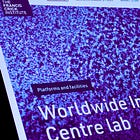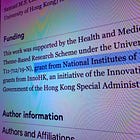'PEGASUS': U.K. to Run 'Largest Ever National Pandemic Response Exercise' After Signing Treaty Granting WHO Lockdown Power
Exercise to simulate novel outbreak, expand health data access, and cement permanent pandemic planning infrastructure across England, Scotland, Wales, and Northern Ireland.
This autumn, the United Kingdom will run ‘Exercise PEGASUS,’ the country’s “largest ever pandemic response exercise,” after agreeing to an international pandemic accord that empowers the World Health Organization (WHO) to recommend lockdowns.
The timing has sparked concerns that governments and international agencies may be coordinating future lockdown scenarios under the guise of preparedness, raising the specter of another orchestrated pandemic event.
The revelation comes as the U.S. Defense Advanced Research Projects Agency (DARPA)—the Pentagon’s military science division—prepares AI-driven simulations for pandemics caused by “natural or man-made infectious agents,” while simultaneously funding researchers who are now proposing to infect humans with aerosolized influenza under the guise of improving disease models.
Follow us on Instagram @realjonfleetwood & Twitter/X @JonMFleetwood.
If you value this reporting, consider upgrading to a paid subscription.
In May, U.K. Prime Minister Keir Starmer signed the WHO treaty, which was “designed to help the body co-ordinate the international response to any future pandemics,” The Telegraph reported.
“The treaty has wide-ranging implications for how the world would deal with a Covid-style outbreak, including by encouraging better disease surveillance and the sharing of vaccines and other medicines.”
Cleverly, the ‘WHO Pandemic Agreement’ explicitly bars the globalist, self-proclaimed health organization from directly imposing vaccine mandates and lockdowns.
“Nothing in the WHO Pandemic Agreement shall be interpreted as providing the Secretariat of the World Health Organization, including the Director-General of the World Health Organization, any authority to direct, order, alter or otherwise prescribe the national and/or domestic law, as appropriate, or policies of any Party, or to mandate or otherwise impose any requirements that Parties take specific actions, such as ban or accept travellers, impose vaccination mandates or therapeutic or diagnostic measures or implement lockdowns,” the document reads.
This section was added to the treaty in reaction to worldwide pushback against the WHO.
For example, U.S. President Donald Trump signed an executive order (EO) withdrawing the United States from the WHO on January 20, 2025.
That EO was apparently only as thick as the paper it was signed on, however, as the U.S. Centers for Disease Control and Prevention (CDC) and Food and Drug Administration (FDA) were still “actively participating” in virtual meetings with the WHO at the Crick Worldwide Influenza Center in London.
The Trump admin had granted an “exemption” for bird flu meetings with the WHO.
Weeks later, pharmaceutical giant Arcturus Therapeutics was granted “Fast Track Designation” from the FDA for a self-amplifying mRNA (sa-mRNA) H5N1 avian influenza “bird flu” vaccine called ARCT-2304.
The following month, the U.S. Department of Health and Human Services (HHS) and the National Institutes of Health (NIH) announced the development of a “next-generation, universal vaccine platform” called ‘Generation Gold Standard’ that will focus on bird flu jab creation.
The NIH has funded the creation of drug-resistant, mammal-infecting, and transmissibility-enhanced influenza viruses—including bat-human hybrids in Missouri, chimeric canine-bird-human strains in China, and over 200 synthetic, barcoded SARS-CoV-2 constructs built from scratch and engineered for enhanced human transmission—despite global consensus that similar gain-of-function research likely triggered the COVID-19 pandemic.
Congress, the White House, the Department of Energy, the FBI, and the CIA acknowledged that a lab-related incident involving gain-of-function research is most likely the origin of COVID-19, raising concerns that ongoing experiments like these could trigger another pandemic.
WHO Treaty Lays Legal Groundwork for Worldwide Lockdowns
Despite language in the WHO treaty banning the organization from explicitly ordering sovereign nations to impose authoritarian pandemic measures, it grants the WHO broad authority to recommend “social measures” like lockdowns through a binding framework that pressures member states to comply via national pandemic plans, global oversight bodies, and international coordination mechanisms.
The following articles in the treaty pave the way for coordinated, WHO-endorsed lockdown scenarios across member states:
Article 6.2(a): This clause requires countries to maintain “social measures” during pandemics, a term historically used to justify lockdowns, business closures, and school shutdowns.
Article 1(c)(iv): By defining a pandemic emergency as one that demands a “whole-of-government and whole-of-society” response, the treaty lays the groundwork for sweeping national mandates aligned with international directives.
Article 4.4: The treaty gives the WHO’s Conference of the Parties (COP) the authority to craft and issue lockdown-style “recommendations” that are expected to shape national policy.
Articles 15.1 & 15.4: These articles obligate nations to develop ongoing pandemic response plans—including during “inter-pandemic” periods—baking lockdown-style preparedness into permanent policy.
Article 16.1: Governments are told to control pandemic-related information, which may be used to suppress dissent and enforce lockdown narratives under the banner of “science-based information.”
Articles 19.5–6: The treaty establishes a global compliance mechanism that, while “non-binding,” enables the WHO to pressure countries into adopting its preferred policies—including lockdowns—through implementation reviews and international coordination.
Follow us on Instagram @realjonfleetwood & Twitter/X @JonMFleetwood.
If you value this reporting, consider upgrading to a paid subscription.
Exercise PEGASUS: U.K. Government to Simulate ‘Future Pandemics’ in 2025
A U.K. government document titled “COVID-19 INQUIRY: RESILIENCE AND PREPAREDNESS (MODULE 1) REPORT” confirms Exercise PEGASUS “will be held in Autumn 2025.”
It will “require coordination across the 4-Nations”: England, Scotland, Wales, and Northern Ireland.
The purported aim is to “assess significant elements of our preparedness, capabilities, and response arrangements in the context of a pandemic arising from a novel infectious disease.”
The document calls for the creation of a “formal structure” for this type of planning that will involve “cross-departmental collaboration”—all to be “facilitated through agreed mechanisms.”
The U.K. will also “[w]ork to progress new legislation, which is required to create a new legal gateway for the sharing of health datasets,” implying expanded government access to private medical information under the guise of pandemic response, potentially weakening existing data privacy protections.
Permanent Infrastructure, Pandemic Powers, and Centralized Control: What the U.K. Is Quietly Building
The U.K. government’s January 2025 executive response outlines a sweeping reconfiguration of its pandemic preparedness infrastructure, revealing structural changes that raise significant civil liberties and oversight concerns.
Several statements from the document signal a shift toward permanent pandemic governance, centralized authority, and multi-agency control.
One of the most striking revelations is that “work has commenced on preparation for a Tier 1 Exercise (Exercise PEGASUS) on a 4-Nation basis.”
The “Tier 1” designation is reserved for the most critical government operations—typically national security, war preparedness, or terror response—indicating the government is now treating pandemic simulations with the same level of priority.
Further embedding this infrastructure, the government confirms that “a Cross-Departmental Pandemic Resilience Programme Board has been established to provide strategic direction and a coordination and governance function for the programme.”
This board isn’t temporary, but tasked with overarching strategic planning and policy development, positioning itself as a permanent authority within the government’s pandemic response architecture.
In Northern Ireland specifically, the government notes that “the new Cross-Departmental Pandemic Resilience Programme Board led jointly by the DoH and TEO will deliver a programme of work to build resilience and better prepare NI for the challenges of the next pandemic.”
This language confirms that the program is ongoing, formalized, and future-oriented—again pointing to the institutionalization of pandemic control mechanisms.
Finally, the report states that “the 2023 NICCRR was developed through extensive engagement with Cabinet Office, emergency management groups and first responders, and aligns with UK-wide methodologies.”
While collaboration is generally positive, this alignment raises concerns about potential loss of regional autonomy.
Uniform “UK-wide methodologies” may override local policies and decisions in favor of top-down control during emergencies.
Altogether, these developments reflect the construction of a standing, cross-government pandemic governance regime—one that may operate with expanded powers, embedded bureaucracies, and reduced public accountability, all under the justification of preparing for future pandemics.
Follow us on Instagram @realjonfleetwood & Twitter/X @JonMFleetwood.
If you value this reporting, consider upgrading to a paid subscription.
For advertising & sponsorship opportunities reaching 230,000+ monthly viewers, contact us by clicking below.















They can kiss my arse!
Mentally sick people in charge of all this crap